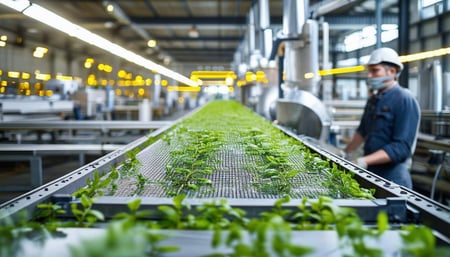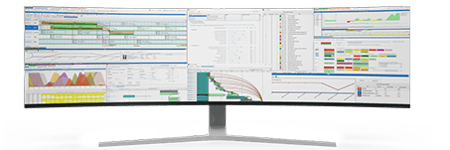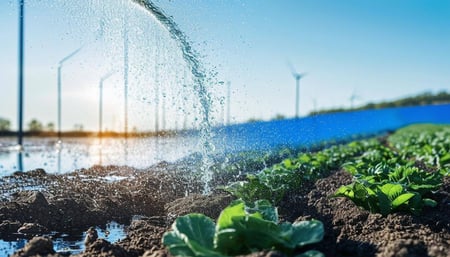Prioritizing Sustainability in Food and Beverage Manufacturing
Consumer demand for eco-friendly products, regulatory pressure to reduce carbon footprints, and the need to control costs amid volatile supply chains are all pushing manufacturers to prioritize sustainability. As an Operations Director, you're tasked with navigating these challenges while driving efficiency and profitability. Leveraging software like PlanetTogether in tandem with enterprise systems such as SAP, Oracle, Microsoft, Kinaxis, or Aveva can be instrumental in your journey towards sustainable operations.
This blog will explore how the integration of advanced planning and scheduling (APS) systems like PlanetTogether with leading enterprise software can help Operations Directors achieve measurable sustainability goals, reduce waste, optimize energy use, and drive both top-line and bottom-line growth.

Understanding Sustainability in F&B Manufacturing
Sustainability in F&B manufacturing encompasses several facets, including energy efficiency, waste reduction, water conservation, ethical sourcing, and carbon footprint reduction. Given the complex nature of F&B supply chains, sustainability efforts must permeate every operational level—from procurement and production to distribution and end-of-life management.
For Operations Directors, balancing sustainable practices with productivity demands requires a comprehensive view of resource usage, real-time visibility into supply chain efficiencies, and tools to optimize production schedules. An integrated approach using PlanetTogether and ERP or supply chain management systems like SAP, Oracle, Microsoft, Kinaxis, or Aveva can offer the insights and control needed to prioritize sustainability without sacrificing operational performance.
![]()

Why Integrate PlanetTogether with Enterprise Systems?
PlanetTogether’s APS capabilities excel in optimizing production schedules, reducing lead times, and minimizing waste. When integrated with ERP systems like SAP or Oracle, or supply chain management platforms such as Kinaxis and Aveva, the benefits compound significantly:
Enhanced Data Synchronization: Integration enables real-time synchronization of data across systems, giving you a comprehensive view of all production, inventory, and scheduling aspects. This connectivity allows you to make informed, sustainability-centered decisions that are data-driven.
Streamlined Resource Management: By aligning production schedules with inventory and procurement data, integrated systems can reduce overproduction, minimize stock wastage, and ensure that resources are used more efficiently.
Informed Decision-Making with Predictive Analytics: Integration brings predictive analytics capabilities, enabling Operations Directors to proactively address potential sustainability bottlenecks, such as excessive energy consumption or waste generation during peak production times.
Reducing Waste Through Optimal Scheduling
One of the most immediate impacts of a PlanetTogether integration is the potential to reduce material waste. Food and beverage production is notorious for its waste levels, often resulting from overproduction, spoilage, and non-optimal batch sizes.
Example Scenario
Consider a beverage production facility that uses PlanetTogether in conjunction with SAP. PlanetTogether’s APS system can create optimal batch sizes and production sequences based on historical data from SAP. By syncing with real-time demand forecasts, the system can minimize overproduction, reducing both raw material waste and the energy used for excess production.
In practice, this approach enables:
Accurate Production Matching: Producing only what is needed to meet demand, reducing excess stock that may otherwise go to waste.
Reduced Spoilage: With shorter lead times and efficient schedules, the freshness of perishable products is preserved, and spoilage is minimized.
Energy Efficiency Through Precision Scheduling
Energy consumption is one of the largest contributors to a facility’s environmental footprint. By strategically managing energy usage, F&B manufacturers can make substantial progress toward sustainability goals.
Integrating PlanetTogether with Aveva, known for its operational data management and IoT solutions, allows Operations Directors to incorporate energy consumption metrics into production scheduling decisions. This approach enables more energy-efficient planning by:
Scheduling Energy-Intensive Processes During Off-Peak Hours: By aligning production schedules with times of lower energy demand, companies can reduce their peak energy usage, potentially lowering costs and reducing the strain on the power grid.
Minimizing Idle Time for Machines: When machines are only active when absolutely necessary, the energy they consume in idle modes can be minimized, enhancing overall energy efficiency.
With such precision, energy savings not only contribute to sustainability but also provide significant cost savings—a clear win-win for F&B manufacturers.

Optimizing Water Use with Real-Time Visibility
Water is another critical resource in the F&B industry, used in everything from production processes to cleaning and cooling. By integrating PlanetTogether with ERP systems like Oracle, Operations Directors gain real-time visibility into water usage across production cycles.
This integration supports sustainable water management by:
Identifying High-Consumption Processes: Operations can identify stages of production where water usage spikes, enabling targeted efforts to reduce consumption.
Implementing Smart Scheduling: By aligning cleaning schedules with production needs, water-intensive cleaning processes can be optimized to use the minimum amount of water required without impacting quality or safety standards.
An F&B facility could leverage this data to implement water recycling or reuse initiatives. For example, wastewater from one production cycle could be filtered and reused for non-critical processes, further reducing water consumption.

Sustainable Sourcing and Traceability
With consumers demanding transparency in product sourcing, sustainable sourcing has become integral to F&B manufacturing. Integrated systems allow companies to trace ingredients back to their origin, ensuring compliance with sustainability standards and supporting responsible sourcing practices.
Using PlanetTogether alongside Microsoft Dynamics, for instance, Operations Directors can track ingredient sourcing, verify supplier certifications, and ensure materials come from sustainable sources. This transparency is invaluable for sustainability audits and aligns with consumer expectations around ethical sourcing. Key benefits include:
Real-Time Supplier Monitoring: Quickly identify and resolve sustainability concerns in the supply chain.
Sustainable Procurement Planning: Prioritize sourcing from suppliers with high sustainability ratings and optimize orders to minimize transportation impact.

Supporting Circular Economy Initiatives
A circular economy approach is essential to sustainable manufacturing, focusing on the reuse, recycling, and reduction of resources. F&B manufacturers can implement circularity in areas like packaging, by-products, and energy use.
Through integration, systems like PlanetTogether and Kinaxis offer tools for circular supply chain management, allowing for:
Effective By-Product Reuse: Scheduling the recovery and reuse of by-products within production cycles, thereby reducing waste and turning waste streams into revenue streams.
Eco-Friendly Packaging Decisions: Operations can plan production around eco-friendly packaging materials, using only what is necessary to reduce packaging waste.

Monitoring and Reporting on Sustainability Goals
For sustainability initiatives to succeed, they need to be measurable and visible. Operations Directors must track progress against key performance indicators (KPIs) and report on sustainability targets. An integrated PlanetTogether and SAP system, for example, can automate the collection and analysis of sustainability-related data, simplifying the process of monitoring KPIs such as energy usage, waste generation, and water consumption.
Benefits include:
Automated Reporting: Generate reports to track sustainability metrics in real-time, enabling quick course corrections if goals are not being met.
Data-Driven Decision Making: Access to historical and predictive analytics enables you to make informed decisions that support long-term sustainability targets.
Enhanced Compliance: Automating data collection and reporting ensures compliance with sustainability regulations and certifications, a growing requirement in many regions.
As sustainability continues to take center stage in F&B manufacturing, the role of Operations Directors is evolving. The integration of PlanetTogether with robust enterprise systems like SAP, Oracle, Microsoft, Kinaxis, or Aveva offers a powerful toolkit to address sustainability challenges head-on. By streamlining scheduling, reducing waste, optimizing resource usage, and enabling circular economy practices, such integrations empower Operations Directors to lead with a sustainability-first mindset.
Achieving sustainability is not a one-time project but an ongoing commitment. With the right tools and data-driven strategies, F&B manufacturing facilities can prioritize sustainability without compromising efficiency, quality, or profitability. By making sustainability a core part of your operational strategy, you not only meet the demands of today’s market but also help create a greener, more resilient future for the industry.
Are you ready to take your manufacturing operations to the next level? Contact us today to learn more about how PlanetTogether and integrated scheduling solutions can help you achieve your sustainability goals and drive success in the food and beverage industry.
Topics: PlanetTogether Software, Integrating PlanetTogether, Enhanced Data Synchronization, Food and Beverage Manufacturing, Streamlined Resource Management, Informed Decision-Making with Predictive Analytics




















LEAVE A COMMENT